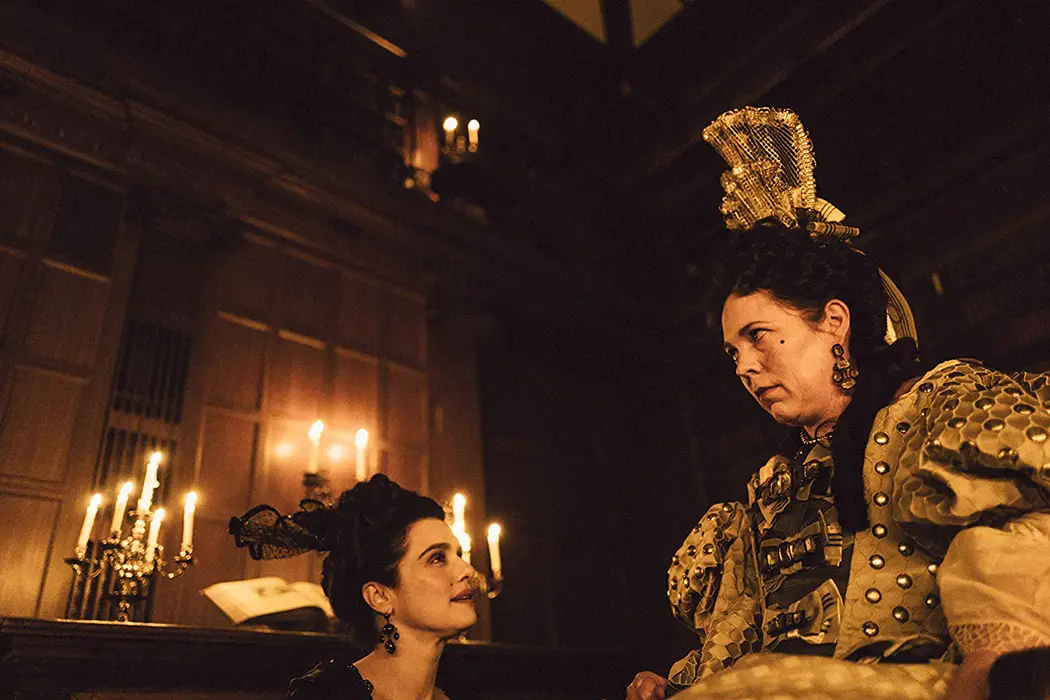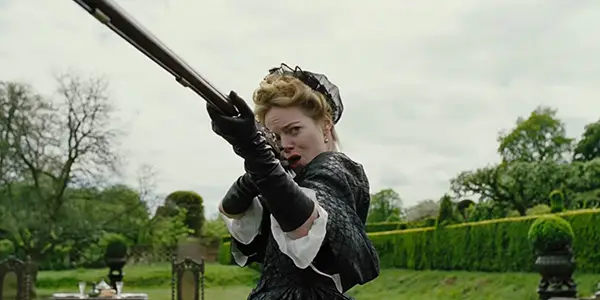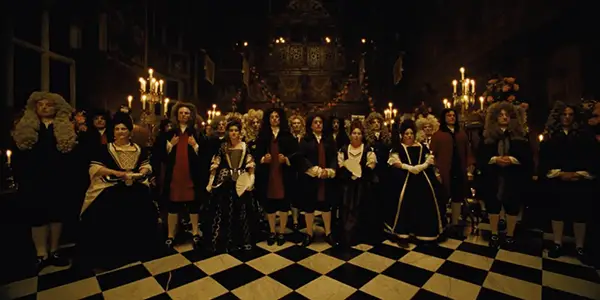NYFF Review: THE FAVOURITE: A Fascinating & Hilarious Character Study

David is a film aficionado from Colchester, Connecticut. He enjoys…
Yorgos Lanthimos has often been a hard pill to swallow. Though I admire his painstaking devotion to a wry and outlandish style of filmmaking, his films are often challenging, bizarre, and unapologetically brutal. That isn’t to say that they don’t often work; The Lobster, for example, was for the most part, an enjoyable outing. Yet, in some cases, such as with his most recent psychological thriller The Killing of a Sacred Deer, I was decidedly not on board.
Thankfully, The Favourite, though easily fitting within Lanthimos‘ oeuvre, is also much more approachable than many of his past films. Partly based on the real-life Queen Anne in the 18th century, it centers on two confidants of Anne who each vy for their own personal hold over the highest ruler in the land. Anchored by its three stellar leads, and filled to the brim with Lanthimos’ trademark dry humor, it is amongst his finest work to date.
A Love Triangle
The Favourite focuses on three central women. They are Queen Anne (Olivia Colman), Sarah Churchill (Rachel Weisz), her agent and closest follower, and Abigail Masham (Emma Stone), cousin to Sarah. Recently, Abigail has traveled to be with her cousin and seek a job under Queen Anne. At the time, Sarah was a prominent figure in Queen Anne’s life, and behind closed doors, the two are involved in a romantic and sexual relationship.

Desiring her own place by the Queen’s side, Abigail soon starts to manipulate those around her in an attempt to gain her own power on the court. Taking a liking to her rambunctious spirit, the Queen assigns Abigail as her Lady of the Bedchamber, much to Sarah’s dismay. Soon, the two find themselves in a power struggle over who will become the Queen’s favourite.
The Three Women
Lanthimos has stated that one of the reasons Nicholas Hoult‘s Robert Harley or Joe Alwyn‘s Samuel Masham, often playing second fiddle. It’s a refreshing change of pace to see such dynamic women as front and center stage of a story not only this funny, but one this rich and layered as well.

Olivia Colman, Rachel Weisz, and Emma Stone are also firmly along for the ride. The conversations between the women often consist of an uproarious series of fast-paced quips and one-liners, with Weisz especially getting some of the film’s funniest lines. Without missing a beat, the back-and-forth power dynamic between Weisz’s Sarah and Stone‘s Abigail makes for an increasingly off-the-wall series of events.
Lanthimos also allows the actors to bring more nautralized performances than in some of his past films, at times simply letting their facial expressions tell the story. Try not to laugh, for example, at the flabbergasted look on Emma Stone‘s face when she unwittingly witnesses Queen Anne and Sarah engaging in a physical relationship for the first time. Such subtly effective humor happens quite often throughout The Favourite.
Production and Period Setting
Taking place during the 18th century, The Favourite sufficiently resembles its time period, though it doesn’t go over-the-top at the same time. As opposed to making everything more extravagant, as many other takes of this particular period of history would’ve done, Lanthimos chooses to somewhat dull it down. For example, he uses mostly natural light throughout the film, including lighting up the corridors of Hatfield House, Hertfordshire, where it was shot, through either direct sunlight during the day or candlelight at night. The effect sometimes gives an illusory appearance, since dark corridors during the day can be pitchblack if they are away from exposed windows.

Wide angle lenses are also frequently used throughout the film, with fish-eyed perspectives that expose the events occurring in their entirety as opposed to allowing the camera to focus in on one particular aspect. Altogether, the film’s aesthetics lend themselves nicely to the story at hand, aptly telling a story of how simple behind-doors politics can easily go awry.
Petty Politics
The Favourite is a prime example of how to bring history to life in a profoundly entertaining fashion. Not wanting to be limited to what the history books have given us regarding the three women at the center of the story, Lanthimos, along with screenwriters Deborah Davis and Tony McNamara, tell an almost undoubtedly fictional account of what really went on behind closed doors (although it should be noted that some modern historians do believe Queen Anne was, in fact, a lesbian).
Yet, historical fiction or not, Lanthimos seems most interested in what it means to be a “favourite,” a position that someone gains when the Queen takes a particular liking to them regardless of their specific family background or prior status, who can then have significant influence over the Queen’s decisions. The power dynamics between Sarah and Abigail, for example, hold sway over some of the Queen’s major choices, such as her raising of the peoples’ taxes or decision to go to war. To recognize that so few people can change the lives of so many, and because of such petty reasons, shines a sometimes uncomfortable light on the world of politics, which might make you question your own faith in the government (as if we don’t have enough to queston already).
The Favourite: Conclusion
To conclude, The Favourite is amongst the more unassuming triumphs of the year. With an infectious sense of humor, some wonderfully captivating performances, and a decidedly deeper takeaway, it is a shining example of a filmmaker at the prime of his art.
What are your thoughts? Are you a fan of Yorgos Lanthimos’ films? Let us know in the comments below!
The Favourite will be released in the U.S. on November 23 and in the UK on January 1, 2019. For all international relase dates, click here.
Does content like this matter to you?
Become a Member and support film journalism. Unlock access to all of Film Inquiry`s great articles. Join a community of like-minded readers who are passionate about cinema - get access to our private members Network, give back to independent filmmakers, and more.
David is a film aficionado from Colchester, Connecticut. He enjoys writing, reading, analyzing, and of course, watching movies. His favorite genres are westerns, crime dramas, horror, and sci-fis. He also enjoys binge-watching TV shows on Netflix.













